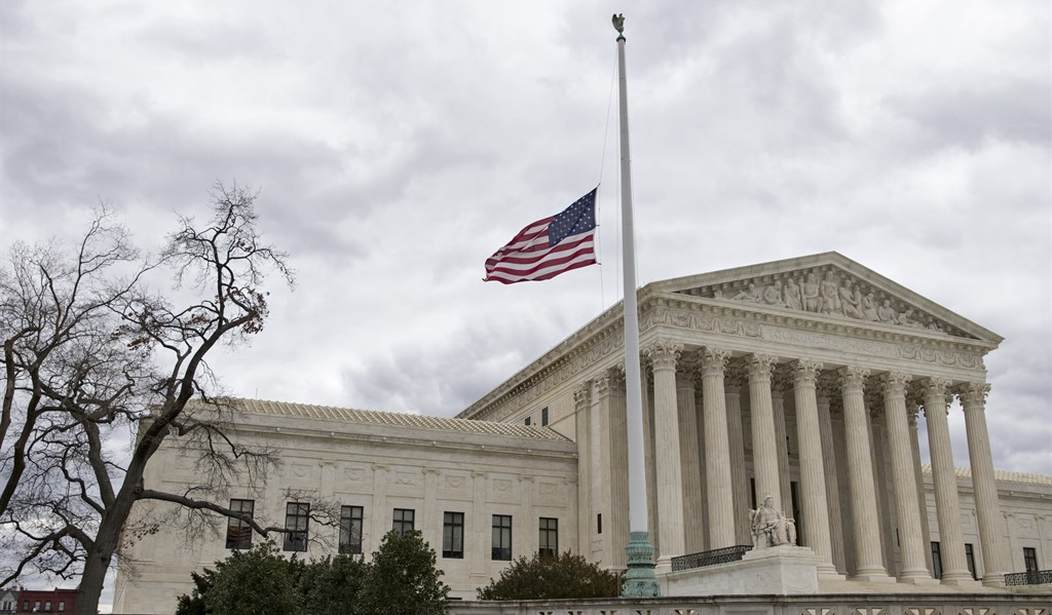For 30 years Antonin Scalia sat on the Supreme Court. He was a legal giant, unimpressed with the pretensions of power and resistant to liberal orthodoxies. He was unafraid to skewer what typically passes for legal “reasoning,” even—or perhaps especially—when expressed by his colleagues. And he sometimes surprised even his critics, rigorously defending the Constitution irrespective of the issue.
His death in the midst of a heated presidential campaign will place the Supreme Court squarely within the vortex of partisan politics. President Barack Obama is likely to choose as his nominee someone dedicated to the concept of a “living Constitution,” which means a document that is infinitely malleable, always available to turn the latest left-wing legal fad into the law of the land.
In recent years the left’s legal agenda has become ever more unconstitutional, even anti-constitutional. Welfare is a right, the unborn are subject to destruction, marriage can be radically redefined by unelected judges, equal protection requires racial quotas, religious liberty only protects private belief, health care penalties to coerce behavior are taxes, gun ownership is for government, and the president can rewrite laws passed by Congress.
Every Democratic nominee is expected to embrace this agenda. Over the years many Republican judicial appointees have charted an independent, even liberal course, from Earl Warren to David Souter. It is hard to think of a single Democratic justice who has broken with left-wing orthodoxy.
In confirmation hearings Democratic senators have called on Supreme Court nominees to accept Roe v. Wade as a super-precedent, apparently more fundamental than the Constitution itself. When ObamaCare came before the high court no one doubted that the four Democratic appointees would unite to back the law.
Recommended
President Obama treats jurisprudence as another weapon of political war. For instance, six years ago he nominated his Solicitor General Elena Kagan, who also had served in the Clinton administration. The president merged justice and politics.
No doubt he will do the same with his appointment to replace Scalia. The Senate has an obligation to stand for the Constitution and rule of law.
The Founders separated powers and allowed the different branches to check one another. One of the most important limits is the Senate’s duty to “advise and consent” on top government appointments. Legislators have an independent authority, even obligation, to scrutinize nominees.
There is no more important duty for a Supreme Court justice than to uphold the Constitution. There will naturally be disagreements over how to apply fundamental principles to changing circumstances. However, that doesn’t mean any result can be justified in the name of judicial interpretation.
The Constitution assumed a sea of liberty within which a few important islands of government power were created. Justices can argue about the islands’ sizes. But a jurist who imagined the Constitution as an ocean of government power with just a few spots of liberty would not be qualified to hold office.
Moreover, if the nation’s fundamental law isn’t rooted in something permanent, then there is no certain protection of any liberty. If justices can act like a continuing constitutional convention in which five men and women can transform settled law on whim, we have passed from the rule of law to the rule of men. Sitting on the high court does not place one above the Constitution.
Thus, the Senate has an obligation to reject any nominee pledged to enshrine liberal zeitgeist as law. There’s no need even to refer the nomination to committee or hold a hearing if the appointment is political. The Senate has a duty to advise and consent, not to say yes. Past Senates, including those controlled by Democrats, have rejected 25 presidential nominees to the top bench.
Indeed, the president’s party set the precedent. In 2003 Democrats filibustered the appointment of the well-qualified (and Latino) Miguel Estrada to the D.C. Circuit Court of Appeals. In 2007 Chuck Schumer urged fellow Democrats to use their new majority to block any appointments by George W. Bush to the high court.
Then-Sen. Obama forthrightly opposed President Bush’s 2005 nomination of Samuel Alito to the Supreme Court (and joined 24 colleagues, including then-Senators John Kerry, Hillary Clinton, and Joe Biden, in attempting to filibuster the nomination). Sen. Obama explained that the Constitution requires “an examination of a judge’s philosophy, ideology, and record” and criticized Alito as “somebody who is contrary to core American values.” Similarly, Sen. Obama voted against the nomination of John Roberts because of the latter’s “overarching political philosophy.”
Sen. Obama's arguments really do apply to anyone President Obama is likely to nominate.
Members of the U.S. Senate are obligated to defend the Constitution. That requires them to reject any attempt by the president to install another radical judicial activist for a lifetime on the bench.

























Join the conversation as a VIP Member